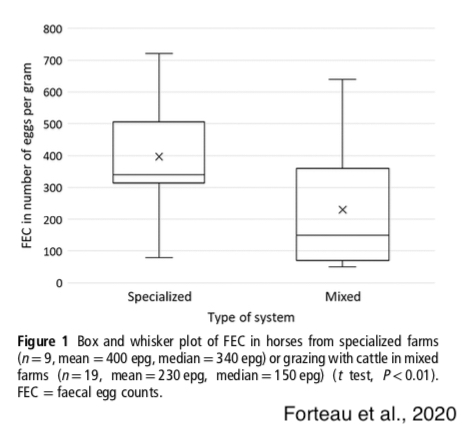new-DEAL
|
Article scientifique L. Forteau, B. Dumont, G. Sallé, et al. Horses grazing with cattle have reduced strongyle egg count due to the dilution effect and increased reliance on macrocyclic lactones in mixed farms Animal, 2020, 14 (5), 1076-1082 Strongyle infection is an important issue in horse breeding. It impairs horse health and performance, with young horses being the most sensitive. Strongyle control has long relied on the systematic use of chemical treatments. However, expanding anthelmintic resistance among strongyles calls for alternative options. Mixed grazing is assumed to reduce strongyle load on the pasture as the result of a dilution effect. This has been shown in small ruminants grazing with cattle, but the putative benefits of co-grazing between horses and cattle have not yet been evaluated. Here, we conducted field surveys and face-to-face interviews on 44 farms from two contrasted saddle-horse production areas, Normandy and northern Massif Central, to compare equine strongyle management practices between specialized systems and mixed horse-cattle systems. Our goals were (i) to quantify breeders’ awareness of the putative benefits associated with the co-grazing of horses and cattle, (ii) to establish whether mixed farming was associated with different strongyle management strategies and (iii) to test whether strongyle egg excretion was reduced in horses grazed with beef cattle. Every breeder relied on systematic calendar treatments, and only 8 out of the 23 mixed breeders were aware that co-grazing of horses with cattle could be used as part of their strongyle control strategy. Management practices were similar across both systems in Normandy. In Massif Central, mixed breeders formed a distinct cluster from their specialized counterparts: deworming was less frequent and stocking density was higher in mixed farms, while specialized breeders seemed more willing to integrate herd and plot management into control strategies. Faecal egg counts measured in horses from Massif Central were significantly reduced when horses were grazed with cattle. This was the result of an increased reliance on macrocyclic lactones in mixed farms ( P < 0.01) and a significant dilution effect ( P < 0.01). When considering a subsample of horses treated with macrocyclic lactones only, young horses grazed with cattle had 50% fewer strongyle eggs excreted in their faeces than horses grazed in equine-only pastures ( P < 0.01). This is the first evidence of the benefits of mixed grazing with cattle as an alternative to control strongyle infection in horses, although this promising alternative remains largely unknown by horse breeders.Keywords: agroecology, beef cattle, farm survey, health management, nematode A consulter ici : https://www.cambridge.org/core/journals/animal/article/horses-grazing-with-cattle-have-reduced-strongyle-egg-count-due-to-the-dilution-effect-and-increased-reliance-on-macrocyclic-lactones-in-mixed-farms/01AE4E64D7B28AA783806B08421C4308  |